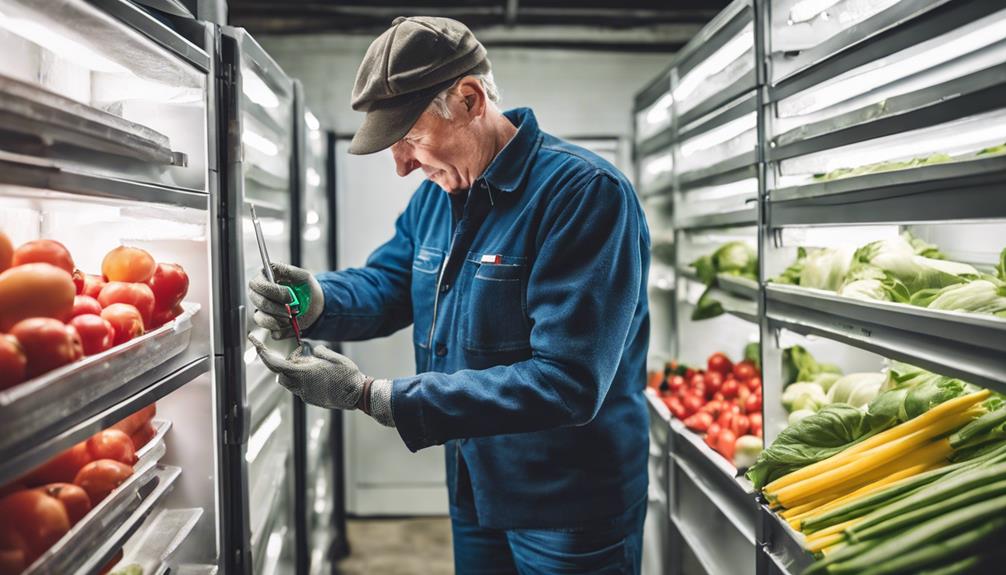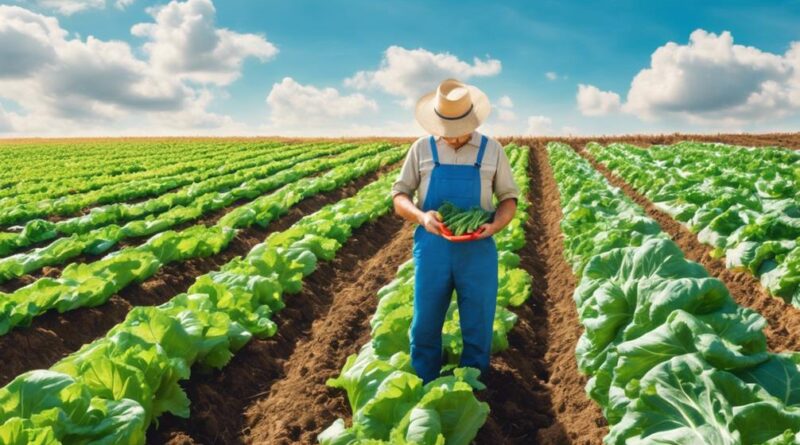Ensuring Food Safety in Sustainable Farming Practices
In the vast landscape of sustainable farming, ensuring food safety is akin to tending to a delicate ecosystem where every element plays a crucial role.
But how can you be confident that the fruits of your labor are safe for consumption? By exploring the intricate web of organic certification standards, contamination prevention practices, and the vital role soil health plays in the safety of your produce.
The journey to food safety in sustainable farming practices is not just about what you grow but how you grow it, shaping the future of agriculture.
Importance of Food Safety in Organic Farming
Ensuring food safety in organic farming practices is crucial for maintaining the health of consumers and the environment. Consumer trust is a fundamental aspect that organic farmers must prioritize. By adhering to strict food safety protocols, organic farmers can assure consumers that the products they purchase are free from harmful chemicals and contaminants. This trust between consumers and organic farmers is built on the foundation of transparency and integrity in farming practices.
Regulatory compliance is another key component in ensuring food safety in organic farming. Organic farmers must comply with local and international regulations to guarantee that their products meet the necessary safety standards. By following these regulations, organic farmers not only protect the health of consumers but also contribute to the overall sustainability of the environment. Regulatory bodies play a crucial role in monitoring and enforcing these standards, thereby holding organic farmers accountable for maintaining food safety.
Organic Certification Standards for Safety
Organic certification standards play a critical role in maintaining the safety of food products in sustainable farming practices. When you see the 'Certified Organic' label on a product, it assures you that specific safety guidelines have been followed throughout the production process. Here are three key aspects of organic certification standards that focus on safety:
- Pesticide Residue Monitoring: Organic certification requires regular testing to ensure that no synthetic pesticides have been used in the farming process. This monitoring helps in keeping pesticide residue levels within safe limits, protecting both consumers and the environment.
- Strict Regulations on Soil and Water Quality: Organic standards mandate the use of natural fertilizers and sustainable farming practices to maintain soil fertility and prevent contamination of water sources. By adhering to these regulations, the risk of microbial contamination is significantly reduced.
- Traceability and Documentation: Organic certification involves detailed record-keeping to track the origin of products from farm to table. This traceability ensures that any issues related to safety, such as microbial contamination, can be quickly identified and addressed.
Best Practices for Contamination Prevention
Implementing effective contamination prevention measures is crucial in maintaining the safety and quality of food products in sustainable farming practices. To ensure food safety, it's essential to focus on two key aspects: cross contamination prevention and sanitation practices.
Cross contamination prevention is a fundamental step in safeguarding food products. This involves separating raw and cooked foods to prevent the transfer of harmful bacteria. By using separate cutting boards, utensils, and storage areas for raw meat and fresh produce, you can significantly reduce the risk of contamination. Additionally, proper handwashing before and after handling food items is crucial in preventing the spread of pathogens.
Sanitation practices play a vital role in contamination prevention. Regularly cleaning and sanitizing all equipment, surfaces, and storage areas helps eliminate bacteria and other contaminants that can compromise food safety. Establishing a cleaning schedule and using appropriate sanitizers can effectively reduce the risk of contamination throughout the farming process.
Implementing Hazard Analysis Critical Control Points (HACCP)
Prioritizing food safety through the implementation of Hazard Analysis Critical Control Points (HACCP) is essential for sustainable farming practices. By incorporating HACCP into your farming operations, you can proactively identify and mitigate potential hazards at critical points in the food production process. Here are some key aspects to consider:
- Training Programs: Ensuring that all individuals involved in the farming process, from field workers to management, undergo comprehensive training on HACCP principles is crucial. Proper training equips your team with the knowledge and skills needed to effectively implement and maintain food safety standards.
- Risk Assessment: Conducting thorough risk assessments allows you to pinpoint potential hazards that may compromise the safety of your food products. By identifying these risks early on, you can develop targeted control measures to prevent contamination and ensure the quality of your produce.
- Continuous Monitoring: Implementing regular monitoring procedures to oversee critical control points is vital in upholding food safety standards. By consistently monitoring these points, you can promptly address any deviations from the established protocols and maintain the integrity of your farming practices.
Incorporating these elements into your farming operations won't only enhance food safety but also contribute to the sustainability and success of your farm in the long run.
Importance of Soil Health in Food Safety
To ensure the safety of your food products, understanding the significance of soil health is paramount in sustainable farming practices. Soil health plays a crucial role in the quality and safety of the crops you grow. The composition of the soil directly impacts the nutritional content of the plants it supports. Healthy soil is rich in essential nutrients like nitrogen, phosphorus, and potassium, which are then transferred to the crops, making them healthier for consumption.
Moreover, soil composition affects the microbial activity within the soil. Beneficial microbes help in breaking down organic matter, releasing nutrients for plants, and suppressing harmful pathogens. On the other hand, unhealthy soil with imbalanced microbial activity can lead to contamination of crops with harmful bacteria such as E. coli and Salmonella, posing serious risks to consumers.
Integrated Pest Management for Safety
How can you effectively manage pests while ensuring food safety on your farm? Implementing integrated pest management practices is key to maintaining crop protection and pest control without compromising food safety. Here are some essential strategies to consider:
- Biological Control: Introduce natural predators like ladybugs or parasitic wasps to control pest populations. These organisms help keep pest numbers in check without the need for harmful chemicals, promoting a safer environment for your crops and consumers.
- Crop Rotation: Rotate the types of crops planted in specific fields each season to disrupt pest life cycles. This technique helps prevent the buildup of pests that target specific plants, reducing the need for chemical interventions and safeguarding food safety.
- Monitoring and Early Detection: Regularly inspect your crops for signs of pest damage or infestations. By catching pest issues early, you can implement targeted solutions such as pheromone traps or hand removal, minimizing the use of pesticides and ensuring that your produce remains safe for consumption.
Safe Handling and Storage Guidelines

Implement safe handling and storage guidelines to maintain food safety standards on your farm. Proper hygiene practices are crucial to prevent contamination and ensure the quality of your produce. Wash your hands thoroughly before and after handling food, especially when moving between different tasks or produce types. Additionally, regularly clean and sanitize all equipment, containers, and surfaces that come into contact with food.
Temperature control plays a key role in preserving the freshness and safety of your farm products. Store perishable items such as fruits and vegetables in refrigeration units set at the appropriate temperature to prevent spoilage. Be mindful of temperature fluctuations that can occur during transportation or storage, as these can affect the quality and safety of your produce. Implement a system to regularly monitor and record temperatures to ensure they remain within safe limits.
When storing different types of produce, practice proper segregation to avoid cross-contamination. Keep raw meat, poultry, and seafood separate from fruits and vegetables to prevent the spread of harmful bacteria. Utilize color-coded storage containers or labels to easily identify and separate different food items. By following these safe handling and storage guidelines with a focus on proper hygiene and temperature control, you can uphold food safety standards on your farm and deliver high-quality products to consumers.
Ensuring Traceability in Organic Supply Chain
Maintaining traceability in your organic supply chain is essential for ensuring the integrity and quality of your products. To achieve this, consider the following key points:
- Supply chain transparency: Implementing transparency in your supply chain allows you to track the journey of your organic products from farm to table. By utilizing technology integration such as blockchain or RFID tags, you can enhance visibility and accountability at each stage of the supply chain.
- Technology integration: Embracing technology solutions can streamline traceability processes, making it easier to monitor and manage your organic supply chain. Utilizing advanced software systems can help automate data collection, recording, and analysis, improving overall efficiency and accuracy.
- Consumer trust: Maintaining traceability not only ensures compliance with labeling regulations but also builds consumer trust. Providing clear and accurate information about the origin and production methods of your organic products can enhance transparency and credibility, fostering loyalty among consumers.
Frequently Asked Questions
How Do Sustainable Farming Practices Impact Food Safety in Organic Farming?
When you consider how sustainable farming practices impact food safety in organic farming, it's essential to focus on organic certification and food handling practices.
Organic certification ensures that specific standards are met, promoting safe food production. Additionally, proper food handling practices, such as maintaining cleanliness and following regulations, further enhance food safety in organic farming.
These practices not only benefit the environment but also ensure that the food you consume is safe and healthy.
What Are the Key Differences Between Organic Certification Standards for Safety and Conventional Farming Safety Regulations?
When comparing organic certification standards with conventional safety regulations, you'll notice significant differences. Certification comparison reveals that organic standards focus on natural methods and restricted chemical use, while conventional regulations allow a wider range of synthetic inputs.
Safety regulations in organics prioritize soil health and biodiversity, while conventional farming often relies on chemical interventions for pest control and fertilization. These distinctions shape the overall approach to food safety in both farming practices.
How Can Farmers Effectively Prevent Contamination in Organic Farming Practices?
To prevent contamination in organic farming, you need to focus on pest management and water quality. Implementing proper pest control strategies like crop rotation and beneficial insects can help keep pests at bay.
Regularly testing and monitoring water sources ensures high water quality for irrigation and other uses on the farm. By staying vigilant and addressing these key areas, you can effectively prevent contamination in your organic farming practices.
What Are Some Common Challenges Faced When Implementing Hazard Analysis Critical Control Points (Haccp) in Sustainable Farming?
When implementing HACCP in sustainable farming, you may encounter various operational challenges. These can include:
- Establishing critical control points
- Monitoring procedures
- Corrective actions
Additionally, meeting the training requirements for employees to understand and follow HACCP principles can be a hurdle.
Overcoming these obstacles will require dedication, resources, and ongoing commitment to ensure food safety in your sustainable farming practices.
How Does Soil Health Directly Contribute to Ensuring Food Safety in Organic Farming?
To ensure food safety in organic farming, soil health plays a crucial role. Soil fertility directly impacts crop nutrition, influencing the quality and safety of the produce you grow.
Conclusion
In conclusion, ensuring food safety in sustainable farming practices is crucial for protecting consumer health and maintaining the integrity of organic products. By following organic certification standards, implementing contamination prevention measures, and monitoring hazards through HACCP, farmers can uphold high safety standards.
It's also important to focus on soil health, integrated pest management, and proper handling and storage techniques to minimize risks. Traceability in the supply chain is key to maintaining transparency and accountability in organic farming.
